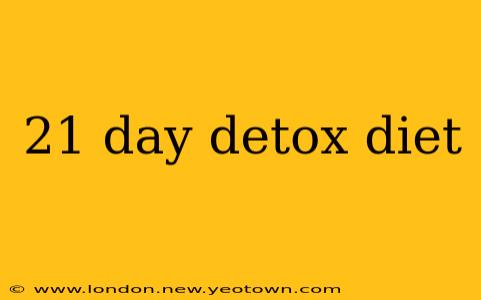The allure of a quick reset is strong. We've all felt that sluggishness, that craving for a fresh start. A 21-day detox diet promises just that – a cleanse, a reboot, a chance to shed unhealthy habits and feel revitalized. But is it all it's cracked up to be? Let's dive into the reality of a 21-day detox and what you can expect along the way. This isn't about quick fixes; it's about building sustainable healthy habits.
My name is Alex, and I've been a holistic health coach for over a decade. I've guided countless individuals through similar journeys, and I'm here to share my experience and guide you through a realistic approach to a 21-day detox.
What is a 21-Day Detox Diet?
A 21-day detox diet isn't a magic bullet for weight loss or a cure-all for every ailment. Instead, it's a structured period of time dedicated to improving your overall health by focusing on nutrient-rich foods and eliminating processed foods, refined sugars, and excessive caffeine. The 21-day timeframe allows for significant habit changes to take root, transforming your relationship with food.
Think of it less as a restrictive diet and more as a mindful reset. It's about nourishing your body with the building blocks it needs to thrive, allowing your organs to work more efficiently, and boosting your energy levels.
What can I eat on a 21-day detox?
The core principle of a 21-day detox focuses on whole, unprocessed foods. This includes:
- Fruits and Vegetables: These are packed with vitamins, minerals, and antioxidants. Aim for a rainbow of colors for maximum nutritional variety.
- Lean Protein: Choose sources like chicken breast, fish, beans, lentils, and tofu. Protein is essential for building and repairing tissues.
- Whole Grains: Opt for quinoa, brown rice, oats, and whole-wheat bread in moderation. These provide sustained energy and fiber.
- Healthy Fats: Avocado, nuts, seeds, and olive oil provide essential fatty acids and support overall health.
- Plenty of Water: Hydration is crucial for flushing out toxins and keeping your body functioning optimally.
Foods to Avoid:
- Processed Foods: These are often loaded with unhealthy additives, preservatives, and excessive sodium.
- Refined Sugars: Limit or eliminate sugary drinks, candy, and baked goods.
- Excessive Caffeine: While moderate caffeine intake isn't strictly forbidden, try to reduce your consumption.
- Alcohol: Alcohol can dehydrate and interfere with the detox process.
What are the benefits of a 21-day detox?
Many people report experiencing several positive changes during a 21-day detox, including:
- Increased Energy Levels: By nourishing your body with nutrient-rich foods, you'll experience a sustained increase in energy throughout the day.
- Improved Digestion: A focus on whole foods can improve gut health and reduce digestive issues.
- Weight Loss: While not the primary goal, many people experience weight loss as a result of healthier eating habits.
- Clearer Skin: Improved nutrition often translates to healthier, clearer skin.
- Better Sleep: Reduced caffeine and improved digestion can contribute to better sleep quality.
How do I prepare for a 21-day detox?
Preparation is key. Gradually reduce your intake of processed foods, sugar, and caffeine in the week leading up to your detox. This helps to ease the transition and minimizes potential withdrawal symptoms. Stock your pantry with healthy, whole foods to make it easier to stick to your plan.
What are the potential side effects of a 21-day detox?
Some individuals may experience mild side effects during the initial days, such as headaches, fatigue, or digestive upset. These are often temporary and typically subside as your body adjusts. Staying hydrated and listening to your body are crucial during this period.
Is a 21-day detox safe for everyone?
While generally safe for healthy individuals, it's essential to consult your doctor before starting any detox program, especially if you have pre-existing health conditions or are taking medications. Pregnant or breastfeeding women should also consult their doctor.
Can I lose weight on a 21-day detox?
Weight loss is a possible side effect, but it's not the primary goal. The focus should be on improving overall health through better nutrition and healthier habits. Sustainable weight loss is achieved through long-term lifestyle changes, not short-term diets.
What happens after a 21-day detox?
The goal isn't to end the detox and revert to old habits. Instead, use the 21 days as a foundation for building a healthier lifestyle. Gradually incorporate some of your favorite treats back into your diet in moderation, focusing on maintaining the positive habits you've established.
A 21-day detox can be a powerful catalyst for positive change. It's not a quick fix, but a journey towards a healthier, more energetic you. Remember to listen to your body, focus on sustainable changes, and enjoy the process!

